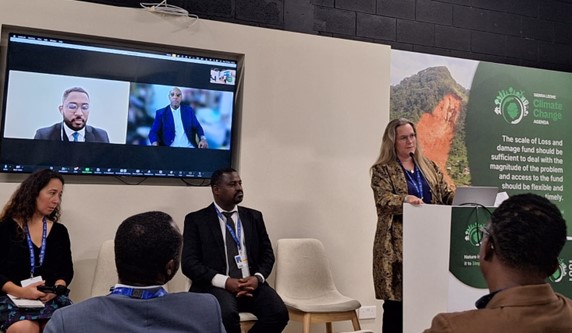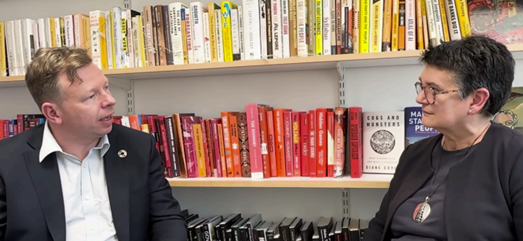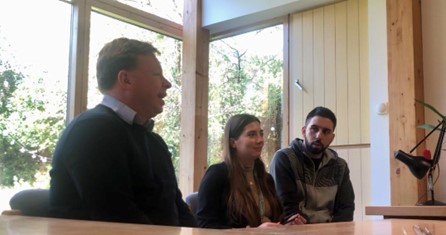Hughes Hall supporting programme expansion for global delivery of United Nation’s 17 Sustainable Development Goals.
Hughes Hall plays pivotal role through its Centre for Climate Engagement along with Lucy Cavendish and key sustainability initiatives across the University of Cambridge.
With thanks to Thalsa-Thiziri Mekaouche for this feature.
Highly Climate Vulnerable Countries: Role of Academia
The triple planetary crisis – pollution, climate change and biodiversity loss – affects us all. Or more accurately, it affects some of us more than others.
Least developed, landlocked and small island countries are already suffering disproportionately from the effects of climate change. In the Caribbean and Pacific, states such as Kiribati and the Marshall Islands, low-lying atoll nations, face the existential threat of irreversible sea level rise. In 2022, the United Nations Security Council recognised for the first time that Haiti’s vulnerability to climate change deepens existing challenges to food security, health, and access to social infrastructure, in addition to triggering extreme forms of civil violence.
In Africa, where 32 of the world’s 48 Least Developed Countries are located, it is predicted that flooding and droughts will intensify. In a country such as Sierra Leone, whose agricultural sector employs 54% of the population and represents 59% of the country’s GDP, this translates into the loss of rural livelihoods and cascading socio-economic crises.

“Climate Law in Highly Vulnerable Countries” at the Sierra Leone Pavilion, at COP 28. Chaired by Professor Marie-Claire Cordonier Segger, Chair of Sustainable Development Law and Policy at the University of Cambridge, and Mr Gabriel Kpaka, Climate Negotiator of Sierra Leone.
In this context, we must think about how to support the transition toward resilient societies. It is a matter of saving human lives. It is a matter of striving toward global justice.
In this world effort, academic institutions have a role to play and institutions such as the Hughes Hall Centre for Climate Engagement play pivotal roles in building bridges between academic insights and impactful climate action. Beyond mobilising finance and international aid, education is essential to achieve the transformations we need.
The law – and its mosaic of international agreements that promote sustainable development, human rights and climate action– is a key tool to address our contemporary challenges. But in order for the law to empower, it has to be understood and utilised to its fullest, not just in classrooms in the Global North; but in courts, tribunals and private practices all over the world, including in the most highly vulnerable nations.
Democratising Education for Global Sustainability and Justice: Building on a Successful First Iteration
The Democratising Education for Global Sustainability and Justice (DemEd Global) programme, based across the University of Cambridge with Hughes Hall and Lucy Cavendish College collaborating, aims to harness the potential of international law to empower communities and governments across the globe.

Collaborating across Cambridge: Dr. Markus Gehring, Fellow and Director of Studies in Law, discusses principles of the Wealth Economy Framework with Professor Dame Diane Coyle, Bennett Professor of Public Policy at Cambridge.
In Autumn 2023, the first full offering of its free and accessible courses on the law and policy dimensions of sustainability reached over 2,200 learners in more than 100 countries.
Supported by a generous gift from alumna Dr Gabrielle Bacon, the programme trains law and policy specialists and gives them the knowledge and skills required to implement essential treaties on all levels. These courses, provided on a scholarship basis, prioritise those from highly climate vulnerable and least developed countries (LDCs). In this spirit, in 2024, Sierra Leone will benefit from one hundred scholarships for current and future law and policy leadersy.
The Honourable Mr. Jiwoh Emmanuel Abdulai, Environment and Climate Change Minister of Sierra Leone, stated: “The Ministry of the Environment and Climate Change is excited about this partnership, which will boost our capacity building efforts for climate negotiations, legislations, and action. The online courses will further help current and future leaders across the country, navigate the complexities of law and policy.”
The Higher Education Minister of Sierra Leone, the Honourable Dr. Haha Ramatulai Wurie, also expressed enthusiasm about the scholarships: “By providing opportunities for current and future law and policy leaders to access high-quality online courses, we are empowering individuals to drive positive change in our country. I am confident that this collaboration will not only enhance the knowledge and skills of the scholarship recipients but also contribute to the sustainable development goals of Sierra Leone.”
In addition to these growing partnerships, which bridge the gap between leading educational institutions and governments from the Global South, educational offerings are being expanded. Alongside four courses to learn how legal principles and practices promote the world’s Sustainable Development Goals, the Paris Agreement on Climate Change, the Global Biodiversity Framework and the true cost accounting of capital, two new courses are being offered this spring on the World Trade Organization and related trade agreements and on the Convention on the Rights of the Child.

Hughes Hall students are also contributors to the initiative: Jelena Solovjova (BA in Law) and Dimitris Vossos (LLM Student) pictured here discussing trade rules and the Sustainable Development Goals with Dr Markus Gehring (left).
Government officials from Haiti also hope to benefit from future cooperations. Adv Jean Idonal Caze, Transparency practitioner for Haiti’s Ministry of Environment, from explained why these courses have the potential to make a difference for his country:
Haiti is considered both a Least Developed Country and a Small Island Developing State. It is also ranked third in the most highly vulnerable countries to climate change, and is a victim of climate hazards, as well as socio-economic crises. Given this intrinsic vulnerability, we cannot afford to overlook the skills learned in the DemEd Global programme, which inform decision-making processes that can ultimately address environmental changes that threaten our existence as a people.
Applications Open Now
The Democratising Education for Global Sustainability and Justice programme is delighted to announce that applications for the Spring session are now open. Current and future law and policy leaders from any sector and any country, anywhere in the world, and especially in the Global South, are now able to register to be considered for selection using the links below.
- Key Essentials: The Global Biodiversity Framework, Sustainable Development and the Law
- Run Dates: 6 May – 19 May 2024
- Link to Express Interest: https://www.eventbrite.ca/e/biodiversity-sustainable-development-and-the-law-course-express-interest-tickets-801598782537
- Deadline to Apply: 25 April (Thursday), 11:59pm BST
- Key Essentials: Trade Rules, Sustainable Development and the Law
- Run Dates: 27 May – 9 June 2024
- Link to Express Interest: https://www.eventbrite.ca/e/wto-agreements-sdgs-and-the-law-course-express-interest-tickets-801740596707
- Deadline to Apply: 25 April (Thursday), 11:59pm BST
- Key Essentials: The Children’s Rights Convention, Sustainable Development and the Law
- Run Dates: 17 June – 30 June 2024
- Link to Express Interest: https://www.eventbrite.ca/e/rights-of-the-child-sdgs-and-the-law-course-express-interest-tickets-801780155027
- Deadline to Apply: 25 April (Thursday), 11:59pm BST
Each short online course provides tailored recorded modules featuring renowned professors and experts in key fields; carefully curated open-access resources; digital summaries of key materials; and assessments. Through live sessions, learners meet experts and course instructors and have the opportunity to engage with fellow members of their cohort, building and strengthening new communities of practice, and professional networks worldwide.
The Programme Committee and Operational Team
The Cambridge-based Programme Committee, under the leadership of Professor Marie-Claire Cordonier Segger, Chair in Sustainable Development Law and Policy at the University of Cambridge, with the advice and guidance of Dr Markus Gehring, is shaping and strengthening capacity to address global sustainability challenges, worldwide, through these efforts. Dr Jellie Molino, an international legal expert on sustainable procurement who recently joined Hughes Hall as a Research By-Fellow in Private Law and Climate Change and who is now working with the Hughes Hall Centre for Climate Engagement, is also advising on the new courses.
Thanks also to Jelena Solovjova (BA in Law Student, Hughes Hall); Dimitris Vossos (LLM Student, Hughes Hall); Adv Tejas Rao (Research Coordinator, DemEd Global); Adv Maeve McDermott, (Programme Coordinator, DemEd Global); and Aniska Bitomsky (Engagement Coordinator, DemEd Global).
Support the Programme
To find out more, especially if interested in supporting the programme, please write in the first instance to the Research Coordinator, Adv Tejas Rao: tr465@cam.ac.uk.
If you are a student at Hughes Hall, you can also join us for the filmed supervision sessions in the coming weeks, during which you will have the opportunity to interact with world-leading experts on cutting-edge legal practices in the field of sustainable development. If you are interested, please reach out to Adv Maeve McDermott at mem86@cam.ac.uk.
15.4.24




